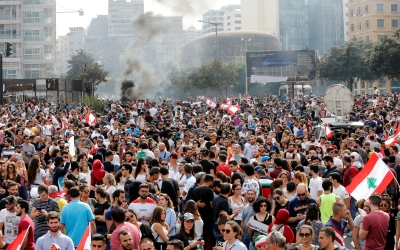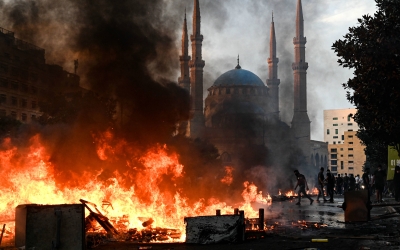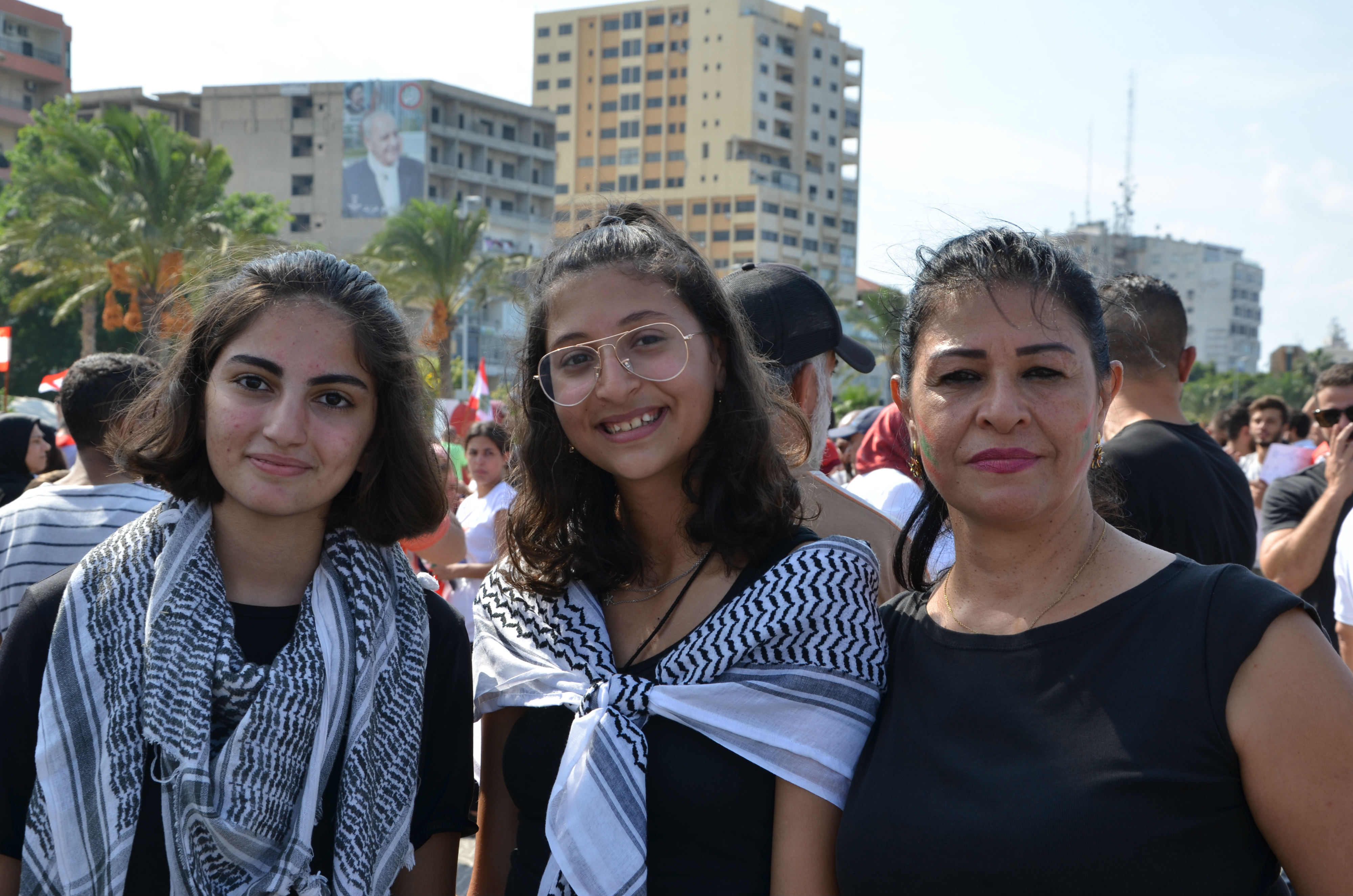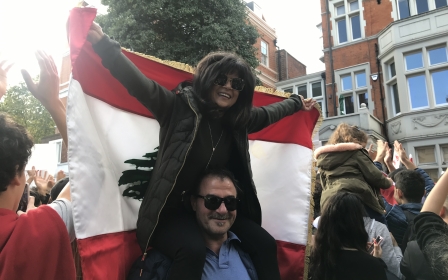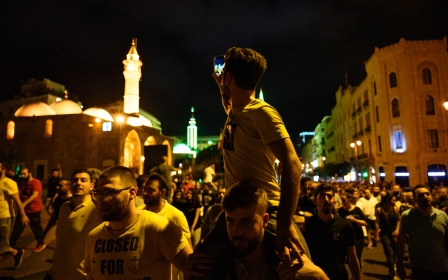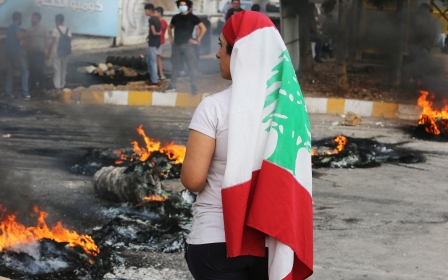Protests erupt in Hezbollah's heartland of south Lebanon, despite intimidation
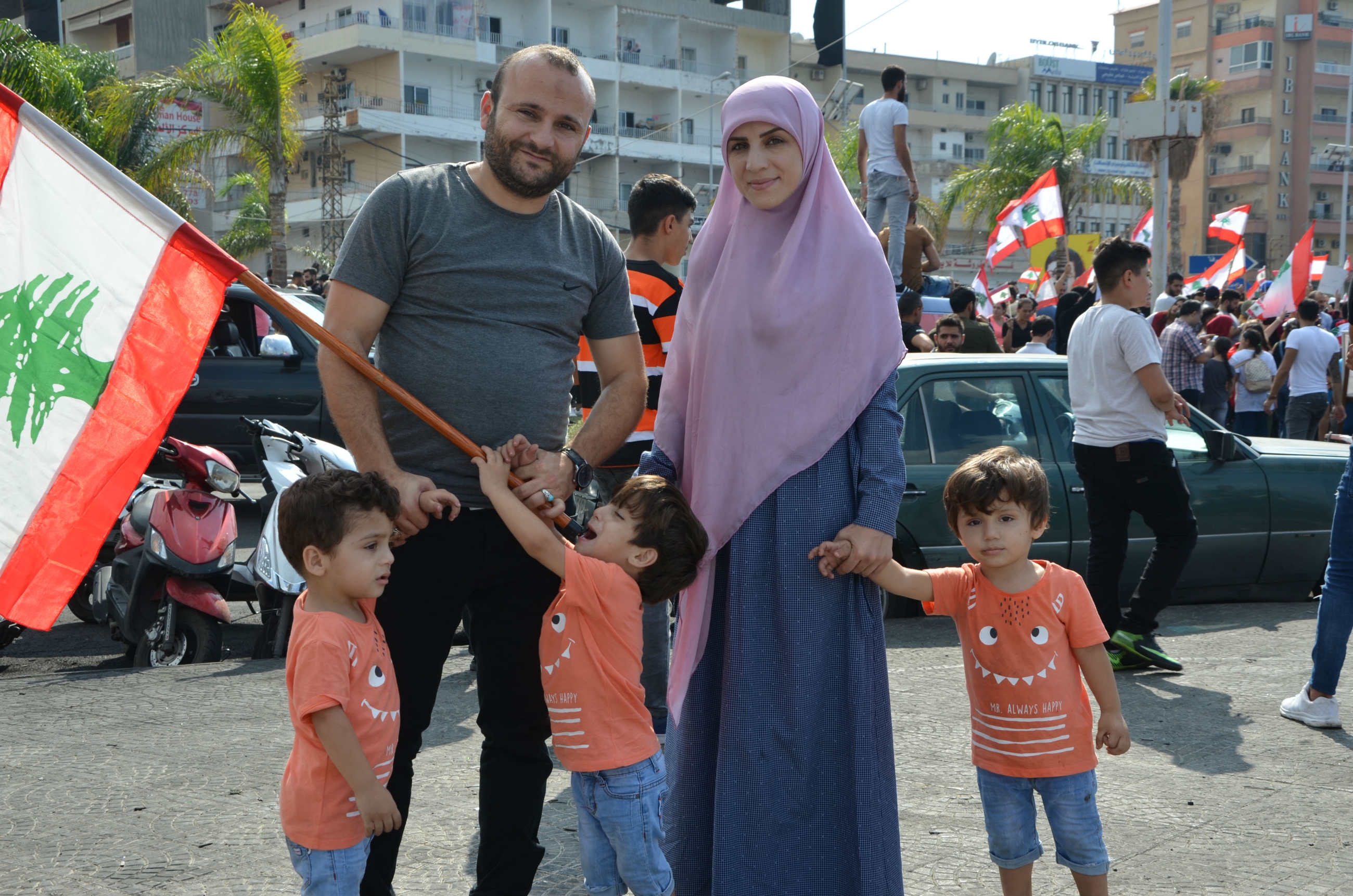
Under the bright sun and facing the sea, over 2,000 protesters gathered on Sunday in Sour, a coastal city in south Lebanon known in English as Tyre. The mood was cheerful, people came with friends and family, all carrying a Lebanese flag.
“The people want the fall of the regime,” they chanted to music.
Protesters are here for the fourth day in a row. Like in the rest of the country, the mobilisation started on Thursday night after the government announced it would impose a $0.20 daily tax on internet calls from apps such as WhatsApp.
Although the government rapidly cancelled the tax, the popular outburst has grown bigger and bigger every day. Other cities in the south have joined the movement, including Nabatieh and Sidon (Saida in Arabic).
“It warms my heart. There are Christians, Muslims… Behind me you can see Shia and Sunnis. We are all together, we are united,” said Rami, a 54-year-old restaurant owner.
This is a first in a city theoretically firmly controlled by two Shia parties that have dominated the south since Lebanon’s 1975-90 civil war: Hezbollah and Amal. All over town, and facing the protesters, the green and yellow flags of both parties fly high. Pictures of religious leaders, martyrs and politicians are everywhere.
Supported by Iran and armed with a militia, Hezbollah is the most powerful political actor in Lebanon today. It also inspires admiration and fear for having fought Israel on multiple occasions.
“This is the first time there are so many people speaking out loud in the south. Before, everyone was scared but now it’s like we finally woke up, the wall of fear came down,” said Imad, a 27-year-old bank employee.
Attacks on protests
The day before, however, armed men tried to intimidate the protesters with violence. In a street a few metres from the seaside, dozens of men dressed in plain clothes attacked the demonstrators with sticks and firearms.
The scene took place in broad daylight, was filmed by the protesters and widely shared on social media. Several people were wounded.
“Yesterday my son came home bleeding. They hit him and broke his phone while he was taking pictures. Why? We are not allowed to protest peacefully?” said Shouhair Chemali, 35.
When we asked who hit her son, another woman cuts into the conversation.
'We have reached a point of no return, I am not scared anymore'
- Shouhair Chemali, 35
“Don’t say who they were, just say they were thugs. They can cause you a lot of trouble. What if they come to your house?” she warned Chemali, who hesitated before continuing.
“They were from Amal, everyone knows it,” she said firmly. “We have reached a point of no return, I am not scared anymore.”
On Saturday, Amal denied all involvement in the attacks and claimed they were isolated acts committed by individuals independent from the party.
Less than an hour after the attacks, the protests resumed.
“They tried to create problems to scare us off but we are free! We are not leaving,” said Houria, 53.
Powerful parties
Founded in 1974 by a Lebanese-Iranian imam, Musa Sadr, Amal helped to bring the Shia community out of its marginalisation and turned it into a political force. Since the 1980s, however, it has been widely associated with its current leader Nabih Berri.
Berri has been speaker of the Lebanese parliament for the past 27 years.
In Lebanon’s sectarian power-sharing system, he holds one of the three highest offices of state and the most senior designated to a Shia. Lebanese prime ministers are always Sunni, while the president must be a Maronite Christian.
In Sour, Amal and Hezbollah are allies and claimed a majority of parliamentary seats in the south with a common list during the last legislative elections.
“I voted for them. In the 1970s, Amal defended the poor and gave us back our dignity. I also have a lot of respect for Hezbollah who protected us from Israel,” Ikram Yazbek, a 32-year-old coffee shop owner, told MEE.
“But now I understand that those fighting on the border are not those who sit at the government. They are thieves and I will never vote for them again.”
In a region where resistance against Israel, which occupied parts of the south from 1982-2000, is an issue that looms large, protesters on Sunday were keen instead to highlight the corruption rife among the ruling parties and the dysfunctionality of the state.
“We don’t have electricity, no water. We live, literally live, in rubbish. They aren’t even collecting the garbage. They don’t do anything for us but steal our money. We want them to leave and never come back,” said Iman, a mother of four.
'I want to have a future'
Sara Mroue, 50, came to the protest with her two 14-year-old twin daughters wearing keffiehs around their necks.
“We simply want our rights and the rights of our children. We pay taxes and I swear, if this money was well used Lebanon could be just like Switzerland,” she said.
One of her daughters, Aline, agreed: “I want to have a future, go to university and find a job in my hometown.”
In Lebanon, public schools lack investment and have a bad reputation. Parents, even from poor social backgrounds, go into debt to send their children to private schools.
When they complete their education, young graduates step into an already saturated job market. The official unemployment rate is 25 percent, but in the south the reality is much worse. As a result, many end up seeking a better chance abroad.
'To have water, electricity, to go to a hospital you need to know someone. Where are my rights? It’s time to tell the truth'
- Mohammed, 24, protestor
“I’m leaving for Africa tomorrow to find work. I’ve been looking here for three years. Our leaders are corrupt, I saw them with my own eyes. They operate like militias,” Mohammed, 24, told MEE.
“To have water, electricity, to go to a hospital you need to know someone. Where are my rights? It’s time to tell the truth.”
In Sour, like everywhere else in the country, most protesters are asking for the government to resign.
“They have to step down, but not only that. After that, there will have to be an investigation on corruption charges,” said Nour Safieddine, a 25-year-old citizen journalist and activist.
On Saturday, Hezbollah’s leader Hassan Nasrallah spoke in support of the government and promised to make reforms.
“Let this government continue but with a new spirit and a new way of doing things. Let it learn the lessons from this popular outburst,” he said during a televised speech.
Hussein, a 25-year-old petroleum engineer and consultant based in Sour, said it’s up to the political parties to prove they can change.
“Amal and Hezbollah must listen to the people and work seriously for the situation to improve. This is their last chance,” he said.
Middle East Eye delivers independent and unrivalled coverage and analysis of the Middle East, North Africa and beyond. To learn more about republishing this content and the associated fees, please fill out this form. More about MEE can be found here.


